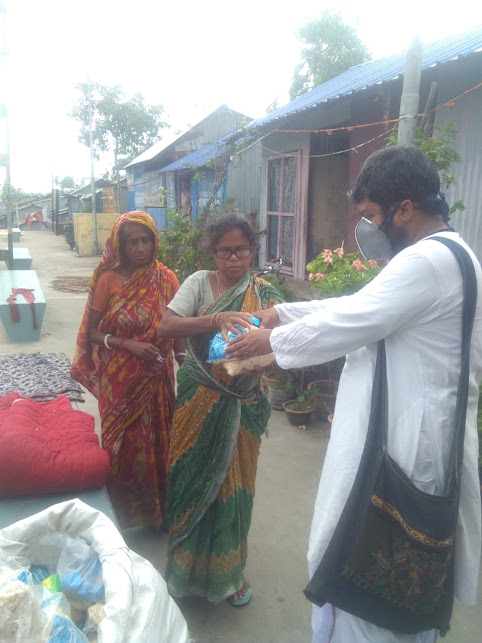

Disaster Relief Work
The Sangha’s first disaster relief project can be traced to 1923 with the Bengal Famine. Through the last 89 years the Sangha has responded to natural calamities such as the West Bengal Floods (1978, 1998, and 2001), Bhopal Gas Tragedy (1980), Cyclone in Andhra Pradesh (1996), and Super cyclone in Orissa (1999), Bhuj earthquake (2001), Mumbai & Gujarat Flash Flood (2005).
Aeyla, Flood relief in Bihar and Assam and Bulbul affected relief are recent work. Relief Work at
Tarakeshwar, W.B.
Sangha provided medical relief work to the pilgrims throughout one month.
Relief work at Tripura:
Rice, Pulses, Potatoes and vegetables, milk packets, biscuits, chira, batasa (sugar drop candy), medicine, utensils etc. were distributed to more than 5,000 flood-affected people at Kailash Sahar of Tripura.
Besides, cooked food was distributed to 5000 people daily for one month. Sangha distributed Mosquito net to 10,000 people, T-shirt & Pant to 15000 people, Blankets to 8000 people; School Bags, Notebooks, Umbrellas, Drinking water bottles to 6000 people and needy students at different places of Tripura. Bangalore (now Bengaluru) Branch provided monthly scholarship to 50 needy girl children upto Class 10th Standard. The branch provides free mid-day meal to 100 persons daily in Ashram.
It is becoming very popular day to day among the poor people of this locality. Nearly 41,000 poor have been provided free food. Regular Yoga classes are arranged – 125 trainees are now practicing yoga under the guidance of 4 Yoga Gurus at Ashram. In different festivals like Maghi Purnima, Kali Puja etc., the branch distributed sari, blankets to approximately 1000 needy persons. More than 4000 people benefitted from Sangha’s guest house facility. Free Ambulance service was provided to 127 patients.
Hearse Van service was provided for carrying 72 dead bodies. Newly constructed Pranavananda Centenary Hall is providing all modern facilities in nominal charges for performing rituals, seminar and other social events. Sachhidananda Hall provides facilities for conducting death rituals like Shraddha ceremony – 161 families benefitted.
